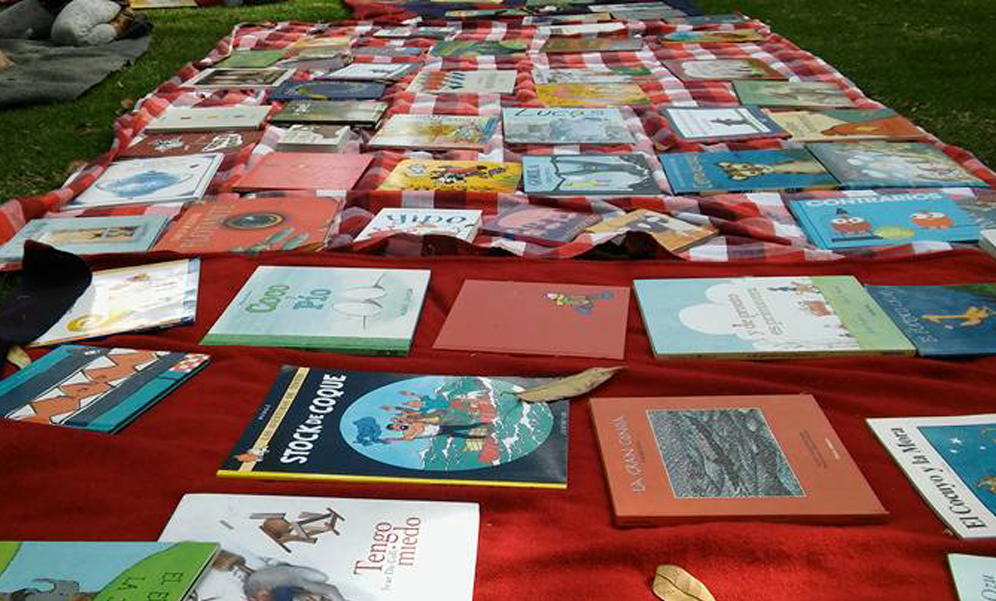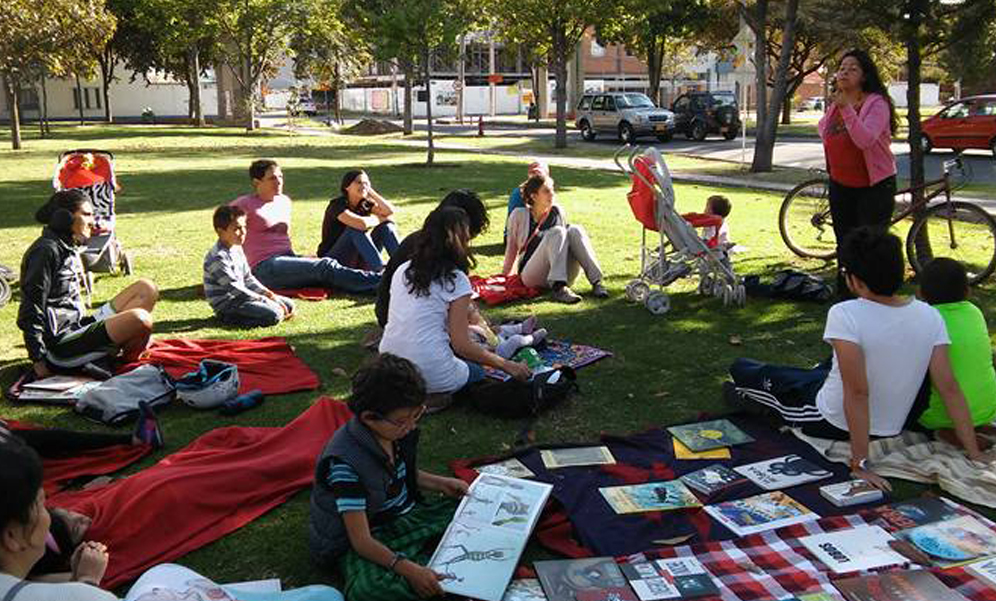In June of 2012 was when the initiative of Picnic de Palabras (Word Picnic) started at el Parque de Alcalá Bogotá, Colombia. The purpose it to share their love for reading. The objective is to bring reading to children, teenagers and adults.The main idea to have a closer relationships with the books is with children’s literature to conquer children and reconquer adults.

How it began
At the moment it was very simple and it is still simple, after about a year there is new addition were a special guest, an author goes once a month to Picnic de Palabras. One of the first guests was Claudia Rueda and throughout Facebook was how the organic expansion began.
Through this media, the first city that reached out was Monterrey, Mexico, then Buenos Aires, Argentina. In every city it is done with different frequency, whether it’s weekly, every two weeks or monthly. In 2016 Picnic de Palabras has presence in Colombia, Mexico, Argentina, Brazil, Chile, Ecuador, New York, USA and Italy.
Why should an initiative like Picnic of Words “Picnic de Palabras” even exist?
The stories closest to our hearts are often those we discovered or chose ourselves. Chances are your dearest experiences are the ones that changed your perspective and motivated you to believe that anything is possible.
Children have emotional bonds with the books, they associate them with experiences and they are stronger when we have shared them with friends and family.
In a world where everyone, especially children, are told what to do, they have seen first-hand how choosing something can be empowering.
So, every day the question is: What if children, regardless of social and economic circumstances, had access to stories they found stimulating? What if we could help them find and create new stories that could redefine their worldview?
The Objective

Bringing people together, children, teenagers and adults to reading in an original manner without rules or obligations. Through an experience were they realize it is easy to read and how wonderful it is, when it’s them that they have the option to choose.
The idea is to conquer young and adult readers through an experience that motivates them to go out and look for stories that are waiting for them.
That readers share readings in which the decisions of the children replace the obligation.
Thus making sure that creating, reading and sharing stories are synonyms of empowerment in their lives, their own love and family affection.
Long and Short term goals
Short term: They want to build a sustainable organization to guarantee the duration and impact of the project. To spread the initiative in other countries, cities, and communities regardless from their geographic location, economic, and social status. A form to achieve this is through our new chapters (either cities, communities or countries) and other developing projects.

In the long term they want to articulate and innovate on what we are doing in order to achieve the best social impact for the greatest possible number of children and communities.
This may involve increasing collaboration with communities, organizations and government in each country, and the design of new experiences for the public that we serve.
The reality
They have an international community of volunteers that with time have included more than 100 people. At least in 19 places and there are between 3 and 5 people supporting and directing the events in the park. Currently, there are also 3 people working with the design and the general global project in Bogotá were the project was born.
The greatest satisfaction will always be when someone tells about how this experience has transformed their life in a positive way. In the neighborhood Alcala, Bogotá, were Picnic de Palabras was born, the daughter of the man that sells ice cream. She knows all the books by hard and she reminds us that were she understands the word of her school texts. It is Picnic of Words were she learn to read.
In a neighborhood of Ciudad Bolívar, one of the areas with the highest rates of socio-economic inequality in Bogotá, a community library was closed. Wendy, a young reading promoter in this neighborhood, realized that they still have many families and children eager to read and through Word Picnic she created a new meeting place, filling that void.
3 years in a half later, it has organically developed in a community of readers that keeps on growing locally, nationally and internationally with new challenges to maintain and improve the social impact of different cultures, languages and different social-economic conditions.
From Monterrey, Mexico, they have told them how they have turned a space were they read and Exchange stories in different languages from all over the world including regional indigenous languages.
As a matter of fact, stories of the impact in a Childs life excites them deeply because they are continuously been contacted to start a new chapter of Picnic of Words in a neighborhood, city or country. They see the possibility to get to know and serve the new communities.
In spite of all the success, the hardest part has been giving it form, create alignment, theory and define its future. Especially because this project was born as an experiment, to try out what happened if we took some of our own books to the park and share them.
A love for words
Being a project which follows such a simple ideal, the important thing is that the team in each chapter is identified with Picnic of Words: share the love of reading and dissemination, to be optimistic, proactive and independent and recognized the challenges and economic and cultural opportunities from their own community.

After they concluded the first experiment, they thought about the experience that was lived. Thanks to blankets and books to be shared and devoured. The concept came immediately, it was picnic not of food, but of words.
The goal of Picnic de Palabras is that everyone has the opportunity to read, independently from their economic strata and that the expansion of this initiative can go around the world. The challenge from this social projectis the cost of the high quality children’s books, since the cost of these books is quite high.


